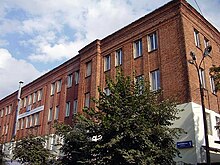Aprelevka Record Plant
 | |
 One of the former Aprelevka Record Plant buildings | |
| Industry | manufacturing of vinyl records |
|---|---|
| Founded | 1910 in Aprelevka, Moscow Oblast, Russian Empire |
| Defunct | 2002 |
| Fate | bankruptcy |
| Headquarters | , |
Area served | countries of ex-USSR (including Russia) |
| Owner | Melodiya (1964-1991) |
Aprelevka Record Plant (Russian: Апрелевский завод грампластинок) was a company that manufactured phonograph records. It was located in Aprelevka, Moscow Oblast.
History
[edit]The factory was founded in 1910 by Gottlieb Heinrich Karl Moll, a German-born industrialist. In the first year of operation (1911), 400,000 phonograph records under the Metropol Record brand name were released. After the 1917 October Revolution, the plant was nationalized and began producing records with performances by Russian revolutionaries. In 1925, the plant was renamed to the "Aprelevka Plant in the name of Memory of Year 1905" (Russian: Апрелевский завод памяти 1905 года).
In the early 1930s, the plant became the main producer of phonograph records in the USSR. The plant got expanded, it employed more than 1000 workers, and the annual outcome reached 19 million records. In the early days of World War II, the “Holy War” song performed by the Alexandrov ensemble was first recorded at the plant. During the war, the plant produced aerial bombs. After the war in 1952, the factory mastered the production of long-playing records and in 1961, the production of the first stereo records began.
In 1964, the Aprelevka Plant became a part of the “Melodiya” All-Union record company as its main production enterprise which subsequently produced up to 65% of all Soviet records. By the early 1980s, the plant employed more than 3,000 people, and the release of records exceeded 50 million pieces per year. In 1989, the factory began production of audio cassettes. After 1991, the structure of “Melodiya” (primarily the centralized system of orders and sales) began to fall apart, and the record plants included in it received unexpected and, as it turned out, burdensome freedom.
Demand for vinyl records began to decline sharply: the purchasing power of the population fell, the production of turntables decreased, and a new optical audio format, CD, entered the market. In 1991, when the Aprelevka Plant released about 33 million records, it was already operating at a loss since the prices of the records remained fixed. Neither the transition to independent customers (SNC Records, Moroz Records and other independent record companies), nor the release of cassettes helped. In 1992, the plant was on the verge of stopping with an annual output of about 10 million pieces. The last batch of records and cassettes was released in 1997. In 2002, the Aprelevka gramophone record plant was declared bankrupt by decision of the Moscow Region Arbitration Court.
The president of the Russian independent label Lilith Records, Olga Kiryanova, said that the Aprelevka vinyl record factory will start working again in the spring of 2009, but these plans were not destined to come true.[1]
Awards
[edit]- Order of Lenin (April 19, 1971)
Nowadays
[edit]Nowadays, other companies and businesses are working on the territory of the former Aprelevka Plant.[2]
In August 2014, information appeared in the mass media[3] that in Aprelevka it was planned to reconstruct the territory of the Melodiya phonograph record plant. Instead of the closed territory of the industrial zone, it is planned to build a city square and a main street with a shopping arcade, set up a park, organize a cultural center, a record museum and a mini-hotel with 100 seats. There will also fit an industrial park with offices and mini-manufactures.
References
[edit]- Companies based in Moscow Oblast
- 1910 establishments in the Russian Empire
- 2002 disestablishments in Russia
- Manufacturing companies established in 1910
- Manufacturing companies disestablished in 2002
- Defunct companies of Russia
- Manufacturing companies of Russia
- Audio equipment manufacturers of Russia
- Phonograph manufacturers
- Companies nationalised by the Soviet Union
- Manufacturing companies of the Soviet Union
